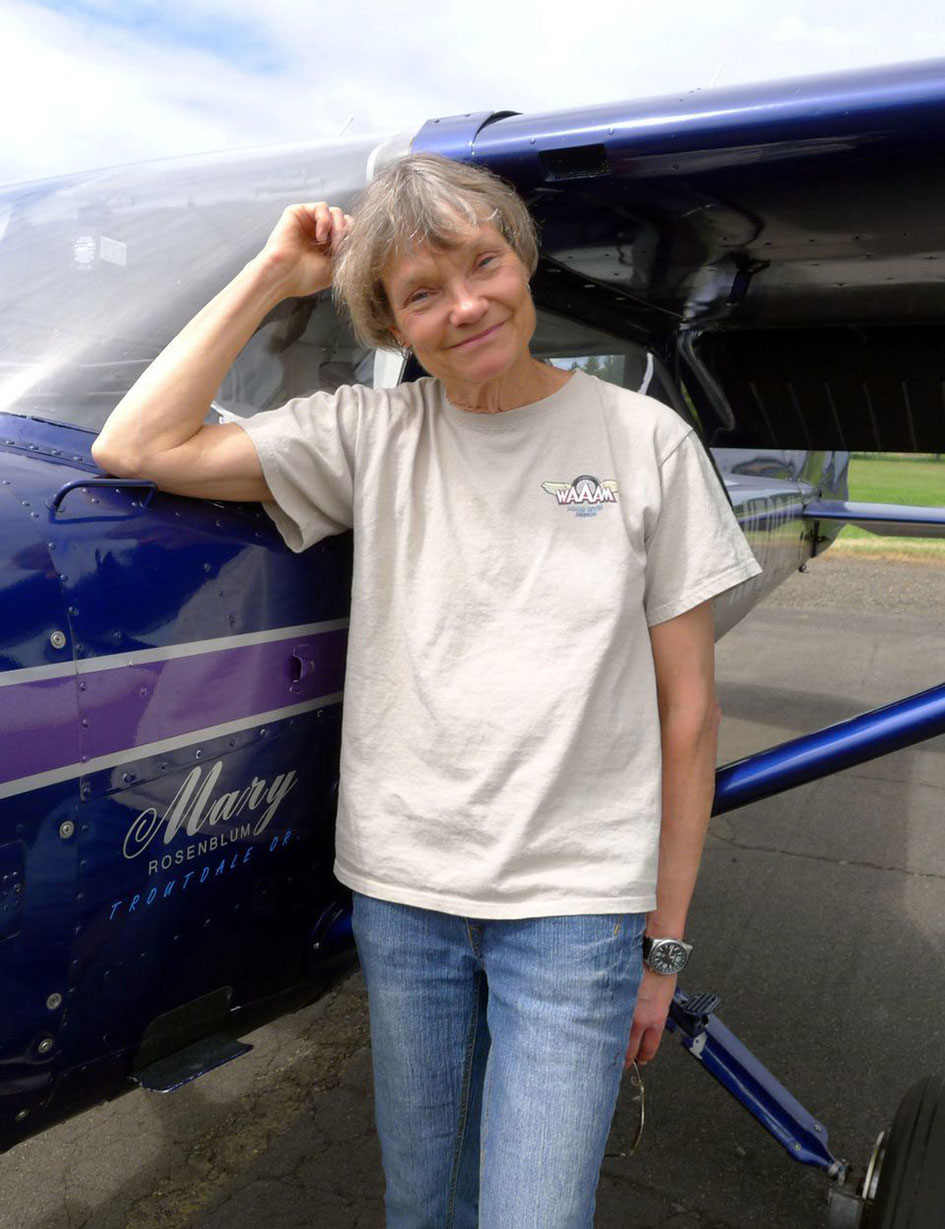Mary Freeman Rosenblum ’74

March 11, 2018, in La Center, Washington, in a plane crash.
Award-winning author Mary Rosenblum, who also played a significant role in Oregon aviation—tirelessly advocating on behalf of pilots of light aircraft—died when her Piper Super Cub plane hit trees and crashed near Daybreak Field in Clark County, Washington.
Born in Levittown, New York, she grew up outside of Pittsburgh, Pennsylvania. She came west in 1970 to attend Reed, where she majored in biology and wrote her thesis, “The Survival of Transfused Feline Erythrocytes,” with Prof. Jeffrey Freedman [biology 1973–75] advising. “Reed is a good place to go if you don’t have a clue what you want to be when you grow up and don’t want someone to tell you,” she said.
Following a brief detour to do medical research in Framingham, Massachusetts, Mary returned to the Portland area, where she lived the rest of her life. She tried her hand at doing bioresearch, farming rats, manufacturing cheese, working at the Oregon Primate Center, and showing livestock professionally.
In 1988, she started writing fiction. “One day I decided that I would simply try my hand at it,” she said. After selling her first story, “For a Price,” to the editor of Asimov’s Science Fiction magazine, she discovered what she wanted to be when she grew up. Other short stories followed, including “Gas Fish,” a Hugo Award finalist, “Nightwind,” a Nebula Award finalist, and the Sidewise Award-winner “Sacrifice” (2008). Some of her short fiction was collected in Synthesis and Other Virtual Realities (1996) and Water Rites (2007).
“I have found science fiction to be a wonderful, warped glass with which to take a look at some of the things we have stopped seeing because they are all around us, and so usual,” she explained.
In 1994 she won the Compton Crook Award for best new novel for Drylands. Other science fiction novels followed, including Chimera, The Stone Garden, and Horizons. She also wrote mysteries under her maiden name, Mary Freeman. Her first mystery novel, Devil’s Trumpet, was published by Putnam in 1999. The detective of her mystery series was an amateur sleuth, a gardener by trade, who, the Oregonian observed, “trips over murder the way other Oregon gardeners trip over blackberry vines.”
Mary lived on two and a half acres outside of Portland with assorted livestock, and raised fruits and vegetables, which she said was part of the reason she was able to survive on a writer’s income. She wrote every day but had no set time or requirements. When the words slowed down, she’d head out to do farm work—digging beds, weeding, hauling manure.
She took up flying later in life, receiving her private pilot’s license in 2010, and once served as president of the Oregon Pilots Association. A strong advocate for safety issues affecting pilots and airports, she testified against the development of a proposed natural gas–fired generating plant called the Troutdale Energy Center because she feared the plumes of hot air arising from the proposed plant’s smokestacks could imperil small planes using the nearby Troutdale, Oregon, airport.
She married Charles Rosenblum ’72, whom she later divorced, and had two sons, Jacob and Nathan, who survive her. Her sister, Sarah Freeman ’77, predeceased her.
Appeared in Reed magazine: September 2018
comments powered by Disqus


![Photo of Prof. Marvin Levich [philosophy 1953–94]](https://www.reed.edu/reed-magazine/in-memoriam/assets/images/2022/LTL-levich1.jpg)
![Photo of President Paul E. Bragdon [1971–88]](https://www.reed.edu/reed-magazine/in-memoriam/assets/images/2020/Bragdon.jpg)
![Photo of Prof. Edward Barton Segel [history 1973–2011]](https://www.reed.edu/reed-magazine/in-memoriam/assets/images/2020/Segel.jpg)








































































